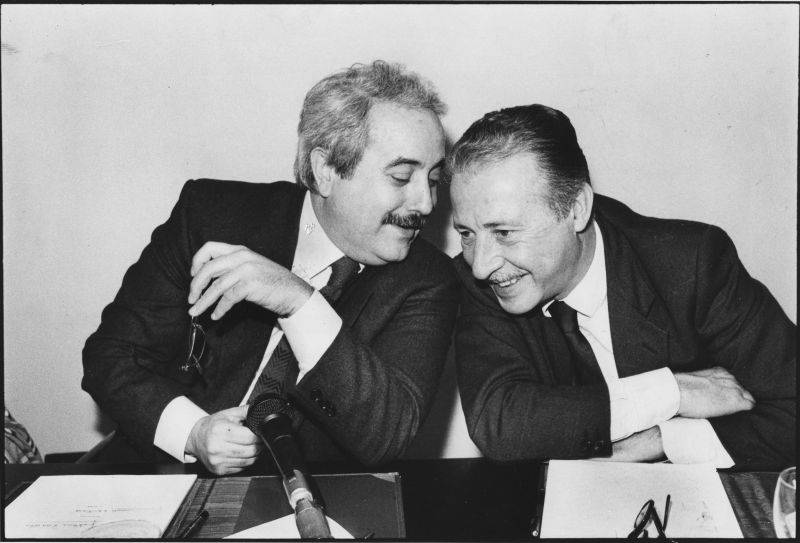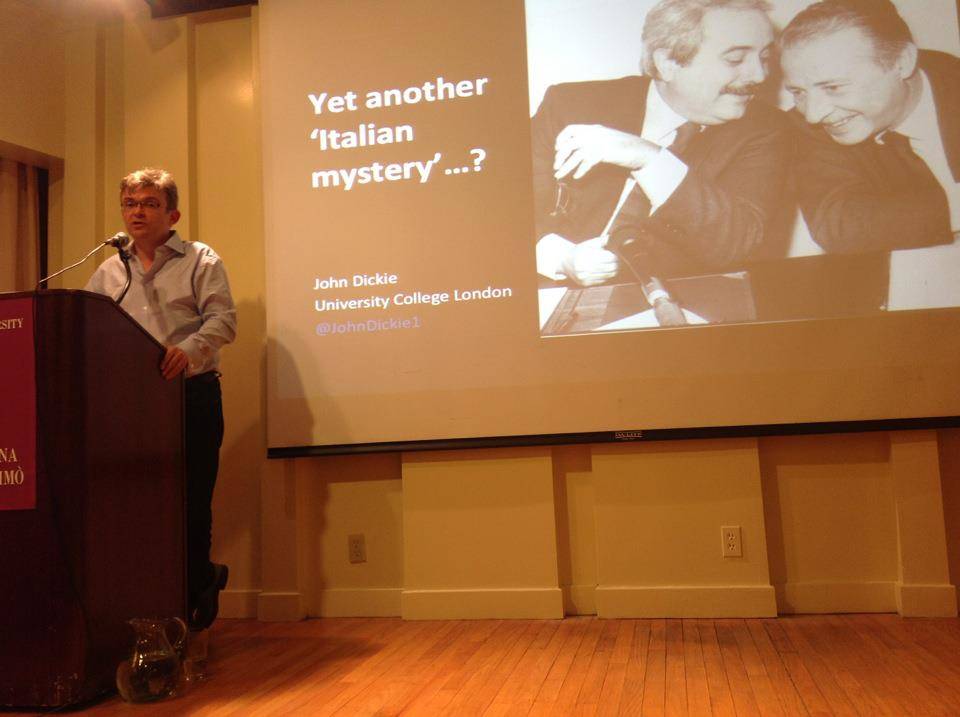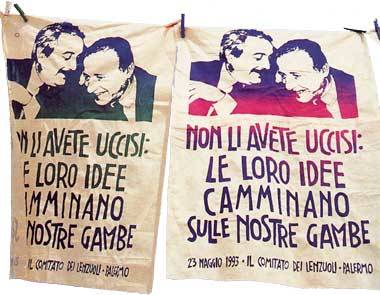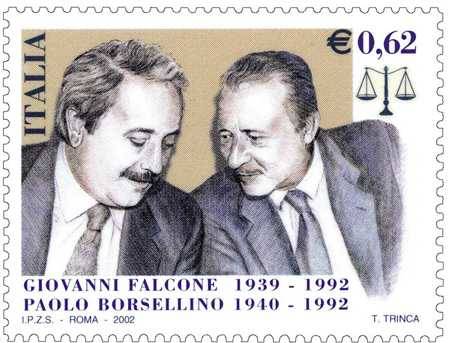Remembering Two Fighters Against the Mafia: Falcone and Borsellino
The image of their smiles, captured in the famous picture by Toni Gentile (see above), is simply ironic: the two men look like long-time friends who are enjoying each other's company, maybe joking about something or someone. That easygoing smile captures, instead, Sicily's darkest hour in the history of the Mafia.
The lives of Palermo prosecutors Giovanni Falcone and Paolo Borsellino began and ended in Sicily's capital, where the two were born. Both men spent their early years in the same neighborhood and although many of their childhood friends grew up to become Mafia characters, they both fought on the other side of the war as prosecuting magistrates. They were both assassinated in 1992 with the use of car bombs within months of each other.
Casa Italiana Zerilli Marimò commemorated the lives and battles of the two heroes who gave their life to fight and defeat the Mafia and the approaching 20 year anniversary of their deaths with a lecture by Professor John Dickie (University College, London), an expert on Mafia who has been described as “an Englishman who can write about Mafia better that an Italian.”
“They were both killed 20 years ago and if some aspects of their assassinations seem to remain shrouded in mystery, what is clear is their civic lesson of courage, loyalty and generous service to the State,” Stefano Albertini, Director of the Casa Italiana, said in a statement promoting the event.
Giovanni Falcone was killed on May 23, 1992, on the orders of Mafia Boss, Salvatore “Totò” Riina. A half-ton bomb was placed under the motorway between Palermo International Airport and the city. Giovanni Falcone, his wife Francesca Morvillo and body guards Rocco Dicillo, Antonio Montinaro and Vito Schifani were killed in the blast. The explosion was so powerful that it registered on local earthquake monitors. Riina was arrested as the commander of the massacre and another mafioso was convicted as well. Giovanni Brusca, one of Riina's associates admitted to being the one who actually detonated the explosives. Riina is believed to be involved in over 1000 murders and was regarded as Sicilians boss of bosses.
Paolo Borsellino was killed a short time later, on July 19, by a car bomb in Via D'Amelio, the street where Borsellino's mother lived. The bomb attack also claimed the lives of five policemen: Agostino Catalano, Walter Cosina, Emanuela Loi, Vincenzo Li Muli, Claudio Traina. The culprits of this bloodbath have not been officially identified. Riina himself admitted he was not involved in the assassination. “They killed him. You can definitely say that to everybody, including the press. I am tired to be Italy's scapegoat,” Riina is reported saying to his legal representative in 2009. “They” refers to the State. “Mr. Riina wants, through me, to explain his theory that Borsellino's killing was organized by the Institutions.”
This point was raised in Dickie's presentation, a lecture that raised many points and questions. What do we owe to Falcone and Borsellino? Why were they murdered? Was there a deal between the Mafia and the State?
“The pair nearly brought Cosa Nostra to its knees with a new methodical approach, as brilliant as it was brave, to unlocking the Mob's code of silence,” TIME magazine reported six years ago when they named, in recognition of their efforts and sacrifice, the magistrates as heroes of the last 60 years in the November 13, 2006, issue. “They are the ones who hurt the Mafia the most in the course of history,” Dickie explained, “Their maxi trial of 1986-1987 against the Sicilian Mafia was something unprecedented.” Of the 474 Mafia members originally charged, 360 were convicted of serious crimes, including 119 in absentia (a trial at which the defendant is not physically present). “The trial succeeded in proving that the Mafia was an actual organization, not a mentality or the actions of individuals,” Dickie concluded.
The answer to the second question is simple: revenge, that's what brought on their killings. The maxi trial was not only successful is convicting criminals but it brought Mafia members to testify against their former associates. “This ultimately resulted in the shutting down of a significant percentage of Mafia-driven narcotics-trafficking and greatly damaged the alliances between Sicilian and American families (Falcone collaborated with Rudolph Giuliani, at the time U.S. Attorney for the Southern District of New York, in operations against the Gambino and Inzerillo families)” Wikipedia reports.
But there is another answer: their deaths were a question of prevention as well. If they continued the way they were going they would have caused even more trouble.
“Giovanni Falcone was perfectly well aware,as he worked, that one day the power of evil, the mafia, would kill him. Francesca Morvillo was perfectly well aware, as she stood by her man, that she would share his lot. His bodyguards were perfectly well aware, as they protected Falcone, that they too would meet the same fate as him. Giovanni Falcone could not be oblivious, and was not oblivious, to the extreme danger he faced – for the reason that too many colleagues and friends of his, who had followed the same path that he was now imposing on himself, had already had their lives cut short.” This is an excerpt from the speech that Paolo Borsellino made on June 23, 1992 a month after the killing, knowing he most likely will be next.
Italian actor and musician Roberto Scarcella Perino, who was obviously moved, read the speech with pathos and respect. “I was honored to read that speech with a strong Sicilian accent. We shall never forget what these men have given to Palermo, Sicily, Italy and all Italians,” he told i-Italy. Hearing from Sicilians who were at the presentation it seems like time has not forgotten what was done but their sacrifice has not changed things. Someone who does not want to be named mentioned how, after their deaths, people in Palermo all hoped things were finally going to change but their hopes were unanswered. Many decided to leave town. Just like Rosaria Schifani, the widow of Falcone's bodyguard, Vito Schifani, who captured the country's attention with a tearful and passionate speech at Falcone's funeral (the video of the speech was shown by Dickie at the Casa and it was so powerful that many were brought to tears 20 years later) where she asked all Mafiosi, including those who were at the funeral, to kneel and ask for forgiveness, did.
In an interview to Corriere della Sera back in 2007 (when, with her son, who was only 4 months old at the time of the massacre, she returned to Palermo), Rosaria was asked if she ever thought things were going to change. Her reply was “Everything could have changed. But the State stopped. The magistrates started fighting with each other again. […] They don't acknowledge the worth of who really makes a difference. I am happy for the numerous investigations that have brought light on treasons even inside the investigative system. But that's not enough. The State has interrupted investigations too many times. Because the State is afraid to look within.” She later accuses magistrates of being “writers,” who do not solve mysteries, “starting from Riina's empty safe, Falcone's database whose memory was erased, and Borsellino's red book that disappeared from the car the day of the bomb.”
Dickie himself admitted that what really happened still is a mystery and in light of recent events (Raniero Busco was declared innocent of having killed Simonetta Cesaroni in the still unsolved murder case of Via Poma after 22 years and the latest investigation on the terrorist attack of Piazza Fontana has been archived after 43 years), this becomes an even more powerful request. He concluded his thorough presentation by saying “I hope this is not going to be another interminable Italian mystery.”





































i-Italy
Facebook
Google+
This work may not be reproduced, in whole or in part, without prior written permission.
Questo lavoro non può essere riprodotto, in tutto o in parte, senza permesso scritto.